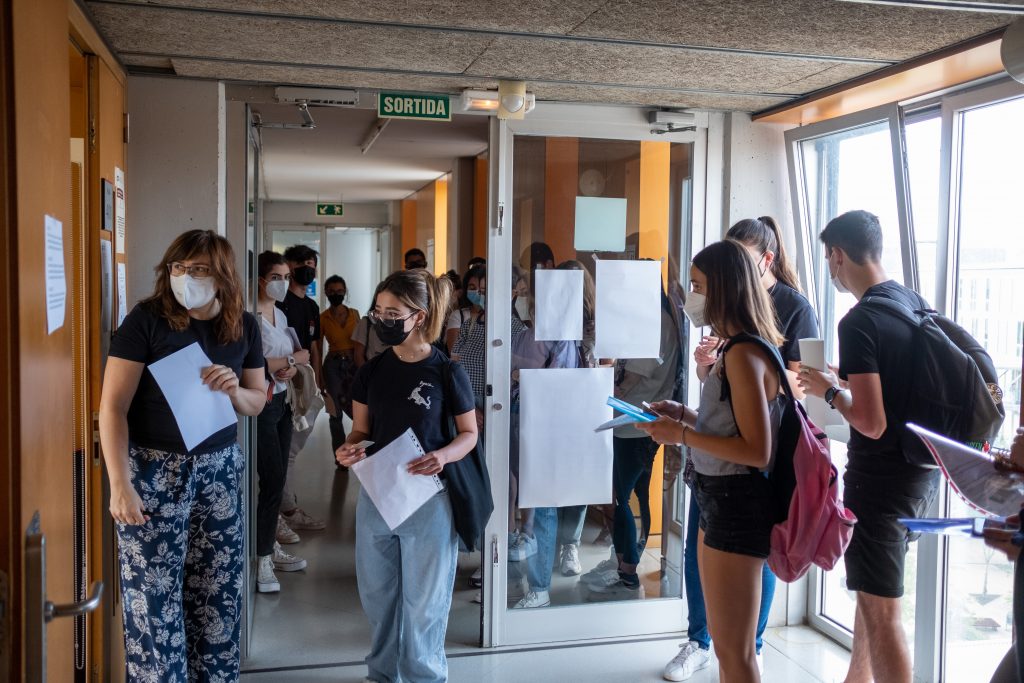26/07/2021
Campus attendance will increase to 70% in the next academic year 2021-22 if the pandemic allows it
PROCICAT has approved the Sectoral Plan for universities, which maintains the mandatory use of masks in any indoor space and recommends cross ventilation

PROCICAT has approved the Sectoral Plan for universities, which maintains the mandatory use of masks in any indoor space and recommends cross ventilation
The Generalitat de Catalunya has announced that for the 2021-2022 academic year, Catalan universities will be allowed to fill their teaching spaces to up to 70% of their authorized capacity, provided that the evolution of the Covid-19 pandemic allows it. If the epidemiological situation is favourable, university teaching activities, practical activities and assessment will continue to be permitted face-to-face. Thus, the universities will continue with the blended model of face-to-face and online teaching that has been in place due to the exceptional circumstances caused by the health crisis. However, the difference for the coming academic year, will be that for the first time since the start of the pandemic, the percentage of face-to-face teaching will exceed that of online teaching.
This is the main new development in the University Sector Plan approved by the PROCICAT for the next academic year. It means that the current 50% restriction on simultaneous student attendance will be progressively extended to 70% at the beginning of the new academic year.
The Sectorial Plan will apply to all universities, places of work, business schools and other higher education centres in Catalonia. According to these regulations, it will be up to each university to implement the measures in such a manner as to guarantee the best possible service to students. The measures are applicable to the entire university community (students, teaching and research staff and administrative and service staff) and to all persons accessing university facilities.
Organizational and protection measures
The Plan means that universities can take a fully flexible approach to all areas of their educational activities by delivering them face-to-face, online or in blended format as the circumstances require. Full face-to-face activities are also permitted in the field of research and transfer, in university laboratories and in the support and administration services, provided that capacity limits are observed at all times. All permitted activities may be carried out as long as the specified hygiene, sanitary and physical distancing measures are complied with.
In this regard, wearing masks will continue to be mandatory in any indoor space where teaching activities are carried out and in work spaces used by or open to the public. Exemptions from mask wearing will be permitted for those persons with some form of medically certified respiratory condition that prevents them from wearing a mask. Likewise, hand washing with soap and water or, when this is not possible, the application of ice or sanitiser to hands at the entrances to buildings, libraries, study rooms, assembly halls and canteens will continue to be a priority.
The Plan maintains the prohibition on drinking directly from water sources and reiterates the requirement for specific containers in common areas of buildings for waste resulting from individual protection equipment (masks, gloves, disposable paper, etc.).
In terms of meetings, the Plan recommends that they be held online wherever possible, especially in the case of those that would otherwise require travel; and any that have to be held face-to-face must comply with all prevention measures.
Ventilation of spaces
The Plan places special emphasis on the importance of good ventilation to reduce the risk of contagion. In this regard, it recommends continuous cross ventilation through doors and windows. For ventilation to be more effective, it advises opening windows and doors that are opposite each other to ensure that air on the inside is constantly replaced by fresh air from the outside. Also, windows and doors should be open for as many hours as possible.
It will be important to ventilate the classrooms and rooms throughout the day, from the moment that students arrive to the end of the day, when all the windows and doors of the classrooms must remain open for at least 30 minutes. If a classroom is empty and has been well ventilated after its last use, its air is free of the virus.
Prevention, health promotion and emotional support
The health, economic and social impacts of the pandemic will have had a significant emotional impact on many people. Thus, a significant number of individuals in the university community may be experiencing grief over the loss of a family member, social or financial difficulties caused by the pandemic or anxiety regarding the situation in general. Consequently, the Plan recommends that universities take action to promote health and emotional support among their communities.
More news about: Coronavirus
